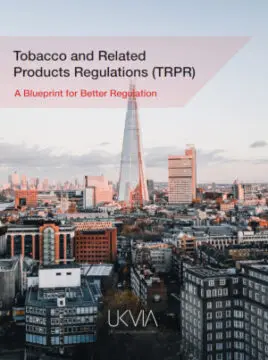 Public opinion is turning against vaping due to misinformation and negative coverage from the media, according to John Dunne, director general of the UK Vaping Industry Association (UKVIA), Britain’s largest trade body for the sector.
Public opinion is turning against vaping due to misinformation and negative coverage from the media, according to John Dunne, director general of the UK Vaping Industry Association (UKVIA), Britain’s largest trade body for the sector.
“Around five or six years ago most consumers viewed e-cigarettes as a better alternative to smoking but a growing number are now saying it’s at least as bad if not worse than smoking – thanks to misinformation and click-bait headlines in publications such as the Daily Mail,” said Dunne (pictured).
The UKVIA cites data from the organisation Action on Smoking and Health (ASH) to support Dunne’s claim. ASH says there has been “a significant increase in misperception of the relative risks of vaping compared to smoking among the adult population”.
The proportion of the adult population incorrectly believing e-cigarettes are at least as harmful as smoking has risen from 7% in 2013 to 34% in 2020, according to ASH’s annual survey.
A similar conclusion can be drawn from recent data from Smoking in England, which suggest e-cigarettes and combustibles have popularly been considered to be equally harmful since 2014, the only year in which a majority of those surveyed said vaping was less harmful than smoking.
The percentage of those who believe vaping is more harmful than smoking has also stayed relatively stable over that period, while the percentage of those saying they don’t know has climbed significantly since 2020 to about 25%, the figures show.
Press freedom vs advertising restrictions
Dunne said press freedom was in effect unfair, given the restrictions the vaping industry faces on advertising and messaging. “There are so many restrictions on what vaping companies can say about their products,” he said. “The press have free rein but it’s hard for the industry to fight back and share messages about the benefits of vaping.”
The UKVIA has had some success remedying this via its global Vapril campaign, which is encouraging smokers to switch to vaping.
The organisation is also calling for the government to agree a set of approved switching messages, which the industry could then use to deliver messages about the benefits of vaping to adult consumers and encourage smokers to switch.
 It has submitted examples of appropriate messaging to the UK government in its document A blueprint for better regulation. These include statements used by the governments of New Zealand and Canada such as:
It has submitted examples of appropriate messaging to the UK government in its document A blueprint for better regulation. These include statements used by the governments of New Zealand and Canada such as:
If you are a smoker, switching completely to vaping is a much less harmful option
Switching completely from smoking to e-cigarettes will reduce harms to your health
Completely replacing your cigarette with an e-cigarette will reduce harms to your health.”
“We’ve had some positive comments in government committee meetings and ministers have used some of the wording and phrasing we’ve put forward so they must be considering it,” said Dunne. “We’re positive that some of the measures we’ve proposed in the document will get through.”
No nicotine = no testing
In addition to advocating the use of switching messages – which the UKVIA also recommends putting inside cigarette packs – the association is calling for more stop smoking centres to offer vaping as an alternative. While this is something the government has backed, currently only around 40% of such centres in the UK offer vaping as a way out of smoking.
“There’s a lot of work to be done to understand why they’re not doing it,” said Dunne. “The ones that do offer vaping see far better results from it than other methods such as patches and gum.”
The UKVIA also recommends testing all e-liquids by the same method rather than allowing nicotine-free ones to skip the testing regime and the UK notification process.
“Safety of our products is always a primary concern,” said Dunne. “Nicotine-containing liquids are highly regulated and tested but those which don’t contain nicotine aren’t and they’re widely used here in the UK. It’s an area where things could potentially go wrong.”
Current regulations also make it mandatory for nicotine-containing e-liquids to be sold in bottles no larger than 10 ml, which Dunne says generates a lot of unnecessary plastic waste, with smaller bottles also being harder to recycle.
“People speak about it being a safety issue but there’s no scientific reason why the nicotine liquids have to be sold in bottles of that size,” he said. “It doesn’t help the government meet its environmental goals and you don’t see hazardous liquids like bleach being sold in 10 ml bottles, so why is this the case for nicotine e-liquids?”
‘Entrepreneurs have solved what doctors couldn’t’
Other governments, such as in Australia, have introduced prescription schemes, some medical societies have come out against e-cigs, and others have called for medical regulation of the devices.
“The medical community has been doing its best to combat smoking for decades with patches and lozenges but these methods haven’t worked very well,” Dunne added. “Entrepreneurs in the vaping industry have solved a problem the medical community has been trying to solve for years.”
Dunne claims the process of getting a device medically approved in the UK is far too slow and laborious and that by the time a device has been approved technology will have moved on, making it obsolete.
“It’s just not necessary to have these devices regulated,” he said. “The system is so slow it’s not fit for purpose for this type of device – it takes five years for a product to go through medical licensing. The only successful company to complete the process was BAT [British American Tobacco], which spent millions putting a product through this process and the end result was a product that wasn’t viable to bring to market. No one else has put a product through this process since.”
- UKVIA director general John Dunne will be chairing day two of the ENDS Europe conference, taking place online on 24th and 25th May. He will also be participating in the panel session “Getting the harm reduction message across – what’s right and what works?”
- ECigIntelligence subscribers can receive a 10% discount on conference tickets, using the discount code ENDS22ECIGINTEL
– Lorraine Mullaney ECigIntelligence staff







